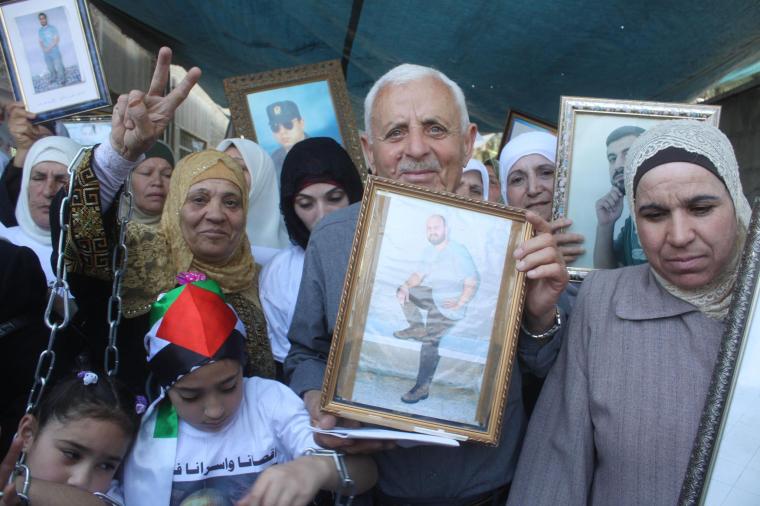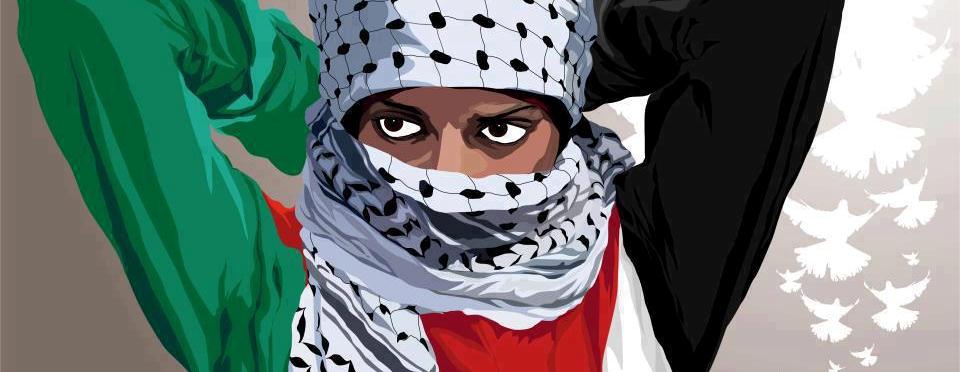Jerusalem family anxiously awaits return of son, Jihad al-Obeidi, after 25 years in Israeli jails

Jihad’s father, holding Jihad’s picture, celebrates his son’s upcoming release from Israeli prison. (Amjad Abu Asab)
Palestinian detainee Jihad al-Obeidi will be freed on 20 January after 25 years in Israeli prisons. His family has already started decorating their house in Jerusalem with colorful lights and Palestinian flags to celebrate Jihad’s freedom. They are excited to welcome him home and fill his place, which has been empty for 25 years.
Jihad al-Obeidi was charged for affiliation with the Popular Front for the Liberation of Palestine and accused of trying to kill Israeli soldiers. He was sentenced to 25 years of detention, despite never having attended a trial. He was absent from the court that sentenced him, after he was expelled for refusing to stand for its racist judges.
 Jihad wrote to his family that the first place he will visit after his release will be the grave of his nephew, Milad Ayyash. Milad was a 17-year-old boy whose life was cut short in May 2011 as he fell prey to an Israeli criminal who still walks freely somewhere, having escaped from justice by virtue of being an Israeli settler. Milad was killed when the settler’s bullet pierced his chest as Palestinians from the Silwan neighborhood of Jerusalem commemorated the 64th anniversary of the Nakba.
Jihad wrote to his family that the first place he will visit after his release will be the grave of his nephew, Milad Ayyash. Milad was a 17-year-old boy whose life was cut short in May 2011 as he fell prey to an Israeli criminal who still walks freely somewhere, having escaped from justice by virtue of being an Israeli settler. Milad was killed when the settler’s bullet pierced his chest as Palestinians from the Silwan neighborhood of Jerusalem commemorated the 64th anniversary of the Nakba.
The Nakba is the gloomiest period in Palestinian history, the year of mass killing, dispossession and systematic ethnic cleansing of three quarters of a million Palestinians from 513 Palestinian villages. The Zionist entity, what is called now Israel, was built on their ruins.
Killed by settler
Silwan residents were demonstrating outside an illegal settler home in the Beit Yonatan neighborhood of East Jerusalem – the site of yet another eviction by radical settlers attempting to Judaize that part of the city – when a window suddenly opened from the settler lair and shots rang out, leaving Milad to drown in his own blood. (See the photos of Milad’s funeral, taken by Mahmoud Illean.)
Tragically, Milad was born and killed during his uncle Jihad’s imprisonment. Milad never saw his uncle Jihad, as only first-degree relatives are allowed family visits – if they aren’t banned – according to the Israeli Prison Service’s inhumane rules. But Jihad was introduced to Milad through his photographs and his mother’s stories of him, which made Milad feel close to his uncle. Milad was attached to his uncle, as well as the Palestinian prisoners in general, as he is also the son of ex-detainee Saeed Ayyash, released in a 1985 prisoner exchange. Milad’s thoughts travelled to the day when his uncle Jihad would be free. He often shared his thoughts with his mother: “We will be Uncle Jihad’s first destination when he is released, right, Mum?”
The painful news of Milad’s murder broke Jihad’s heart. Filled with sorrow at his murder, Jihad decided to make Milad’s wish true and visit him first. He will visit his grave to show that Israel doesn’t kill our children, it immortalizes them, and that, sooner or later, Israel will be held accountable for all its crimes against humanity.
Solidarity hunger strike

A scaned photo of Loai and his comrades taken in prison. Loai is on the very left. Jihad al-Obeidi is the send from the right.
Loai Odeh, a detainee freed in the Shalit deal and expelled from Jerusalem to the Gaza Strip, sparked my curiosity to learn about Jihad al-Obeidi. During the open mass hunger strike launched on Palestinian Prisoners’ Day in 2012, dozens of people, including detainees’ relatives and ex-detainees, went on hunger strike in solidarity inside a sit-in tent in a Gaza park.
Loai was one of the hunger strikers who took the sky as their ceiling and trees as their walls, with a surrounding tent to protect them from the sun. He decorated the tent behind his bed with pictures of detainees who he feels most attached to, including Jihad Obeidy.
That motivated me to Google his name. I found a touching video of his parents that shows the torment Palestinian detainees’ parents typically endure, especially for the sake of their 45-minute family visits. The video began with Jihad’s 75-year-old mother introducing herself, saying, “I am Um Jihad al-Obeidi. I was born in Lifta.”
Lifta
Lifta is a village on the northern fringes of Jerusalem, one of hundreds of Palestinian villages seized by the newly-established Jewish state in 1948. But it is one of the few not to have been subsequently covered in the concrete and tarmac of Israeli towns and roads, or planted over with trees and shrubs to create forests, parks and picnic areas, or transformed into Israeli artists’ colonies. The ruins of Lifta were threatened many times with being bulldozed and turned into luxury housing units.
A sigh, and a moment of silence, followed that sentence, as if Umm Jihad meant to remind everyone that her village is originally Palestinian, and that for the injustice Palestinian people face, we continue to struggle and pay the price of freedom. For many Palestinians, Lifta is a symbol of the Nakba, of their longing for their land and bitterness at their continued refugee status, a physical memory of injustice and survival.

A photo of Um Jihad al-Obeidi, taken from her balcony that overlooks the Old City of Jerusalem (Amjad Abu Asab)
Since Jihad was arrested, his mother fell into depression, then became ill with cancer. She went through chemotherapy and four surgeries. However, her longing to see her son again served as her source of strength. Her fear of passing away before hugging her son again never left her mind. She was able to visit him only once every year because her critical health wouldn’t allow her to travel far.
“May God grant us health and patience to see you freed,” Jihad’s mother says in the video, while hugging her son’s picture and kissing it. “It’ll be the happiest moment when you are set free. God willing, I’ll live long enough to hug you, away from Israel’s bars and jailers’ inspecting eyes, and carry your kids.”
Jihad will be free in a matter of few days, but these days feel like years to his mother.
Jihad’s parents, like all detainees’ parents, suffered from the Israel Prison Service’s (IPS) ill treatment, especially during family visits. In Jihad’s twenty-five years of detention, the IPS transferred him between almost every Israeli jail, so that he never enjoyed a sense of stability. They never considered the distance between his jail and his family’s house. For years, Jihad’s parents traveled long distances to reach prisons, then suffered verbal and physical harassment, humiliation, strip searches and long hours of waiting.
Promises and bitterness
“Jihad keeps promising us that he will never let us do anything at home when he is released,” his father said with a slight smile. “He said he will cook and clean and serve us with all his strength, as he could feel how much we tolerate Israel’s torture to visit him. Sometimes in the winter, during family visit, Israeli soldiers used to make us stand and wait outside prison, as the sky snowed over us.”
Despite these family visits symbolizing a lifeline to prisoners and their families, the happiness of uniting and exchanging stories is mixed with bitterness. “Our tears start streaming down whenever we see him behind Israeli bars,” his father said with tearful eyes. “Our hearts ache to observe how he is growing old there.”
Jihad’s parents’ painful story is about to have a happy ending with his release. But thousands of prisoners are still behind Israeli bars, and they and their families continue to suffer. Thinking of other detainees and their families, who share the same pain, Jihad’s mother said, “My son has served most of his sentence, but many others are serving lifetimes. I call on everyone to remember these prisoners and keep following their just cause. Support them so they regain their freedom soon and return to their families.”
My message to Jihad al-Obeidi: this post is dedicated to you, to congratulate you in advance for your physical freedom. Israel has only succeeded in imprisoning your body, but never your mind, nor your determination and everlasting hope for complete freedom.
I’ve always looked at you, and all your comrades who sacrifice their most precious years for the sake of our freedom and dignity, as heroes. You’re the most dignified and the most courageous. Be certain that your people in Gaza are as excited for your freedom as your people in Jerusalem. Israel’s apartheid walls and checkpoints will never manage to make us apart. I know your happiness will be incomplete, as more than four thousands of your comrades remain inside Israeli jails. But we will raise our voices higher and continue to fight until all jails are emptied.


Dear Shahd:
Please extend to Mr. al-Obeidi, if you are able, just one word –
SOLIDARITY!
May he find some peace and comfort upon his release from hell.
peace and respect,
skulz
LikeLike
January 13, 2013 at 11:42 pm
I hope dear I will be able to see him freed in Jerusalem coz this apartheid regime has made the 30-minutes drive to Jerusalem from Gaza impossible. I hope one day it will no longer be impossible and I’ll be able to meet him and deliver your message to him :)
LikeLike
January 14, 2013 at 1:37 pm
“He will visit his grave to show that Israel doesn’t kill our children, it immortalizes them, and that, sooner or later, Israel will be held accountable for all its crimes against humanity.”
After reading the above, only world came to mind, Shahd!
Insha’allah!
LikeLike
January 14, 2013 at 12:33 am
:) انشاالله
LikeLike
January 14, 2013 at 1:17 pm
I like the helpful info you supply for your articles.
I’ll bookmark your blog and test once more here regularly. I am fairly sure I’ll be informed plenty of
new stuff proper here! Best of luck for the following!
LikeLike
June 12, 2013 at 1:27 am